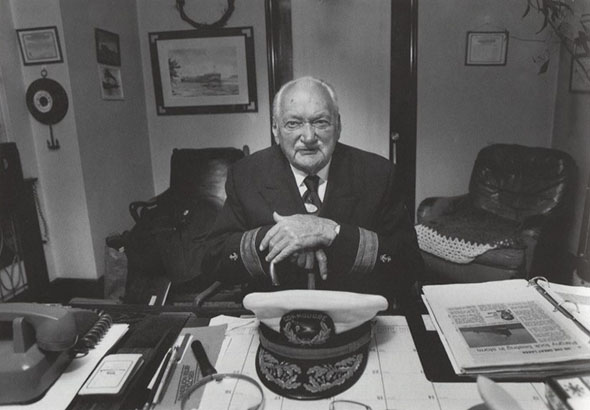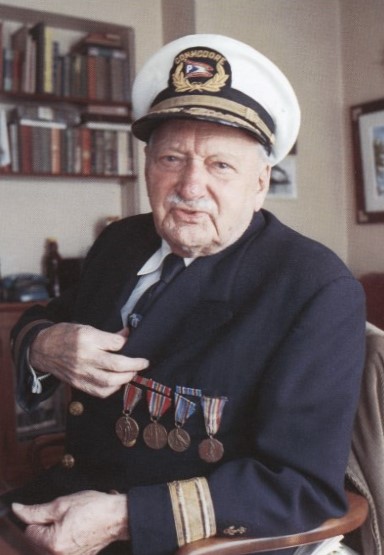Art Form: Great Lakes maritime traditions and sea storytelling
Location(s): Grosse Pointe Park (Wayne County)
Capt. Edward Baganz

Captain Edward Baganz

Captain Edward Baganz in uniform; photo by Al Kamuda
Edward C. Baganz (1900-1996) was born in Berlin, Germany, and immigrated as a young child with his parents to the United States, settling in Detroit. In his teens, while apprenticing with a Detroit architect, he was coerced aboard the Owana, a side-wheeler on the Detroit River, by a "brass button guy" who tricked him by saying "the captain wants to see you." (1) Before he knew it, the Owana was under way bound for Port Huron, and Capt. Baganz was handed an apron by the cook who said, "Glad you're going to help us out." This unusual adventure convinced Capt. Baganz that a seaman's life was for him.
Over the decades, Capt. Baganz rose in rank from deckhand to captain. His first command was the Zenith City in 1940. He then commanded various vessels in the Pittsburgh (U.S. Steel) Steamship Company fleet, eventually becoming one of only four commodores of what was then the largest steamship fleet on the Great Lakes. Captain Baganz retired in 1966, after serving on the lakes for 51 years. Like most captains he led a life of eight months a year at sea, crisscrossing the Lakes many times. While on land, he lived in Grosse Pointe Park and was active in the International Ship Masters Association. During retirement he frequently traveled the Great Lakes, visiting maritime museums, friends, and maritime events.
Captain Baganz was highly regarded by his fellow seamen and especially known for his skill in telling sea stories of his life and experiences on the Great Lakes. One of his favorites was a story he would always end by saying it was "the time a ship saved a lighthouse and a lighthouse saved a ship," about a particularly rough storm in 1940 while captain of the freighter Perkins, which had a close encounter with the Lansing Shoal lighthouse in Lake Michigan. In retirement, he traveled extensively around the Great Lakes on land and by water with fellow retired mariners, often stopping in at maritime events in his dark blue uniform, always willing to share his stories. He would return to his home on Harsen's Island where he could view the passing freighters and exchange a greeting. He participated in the 1990 and 1991 Festivals of Michigan Folklife. Capt. Baganz passed away in 1996.
(1) Baganz, Edward C. Interview with LuAnne Kozma, Harsens Island. 1985.





